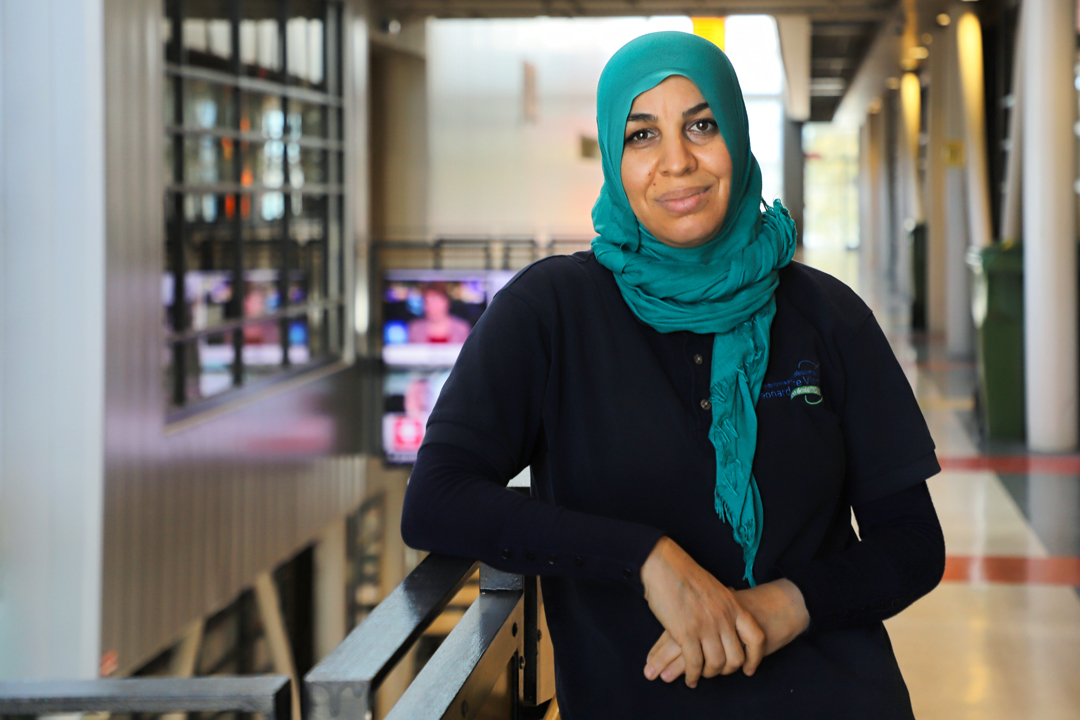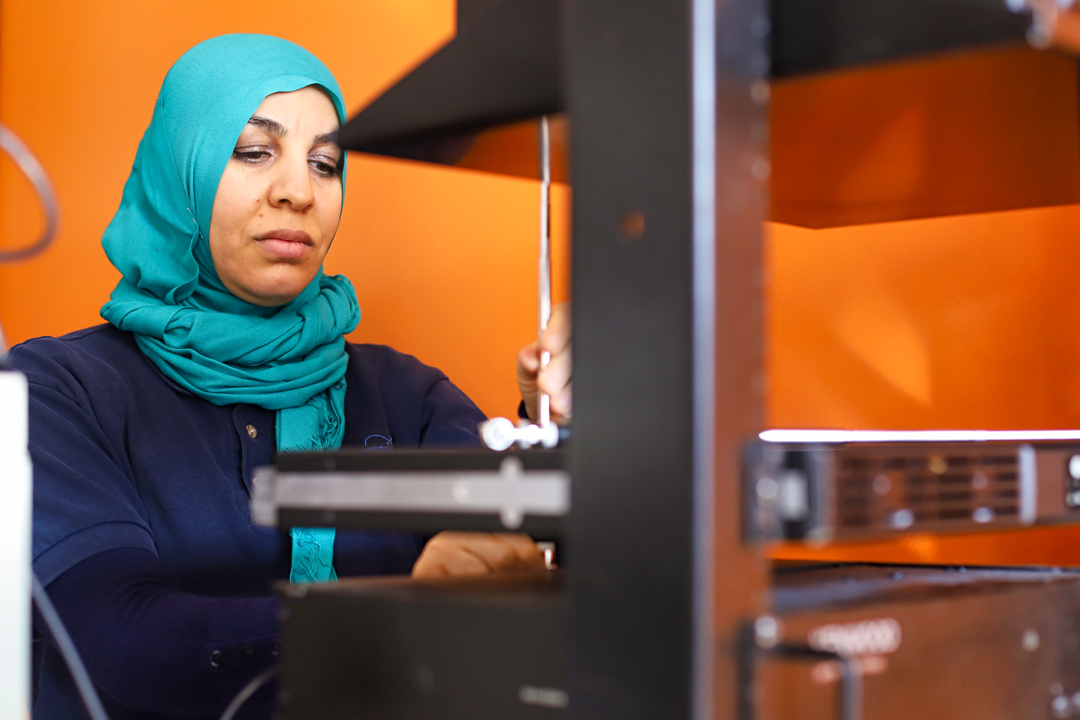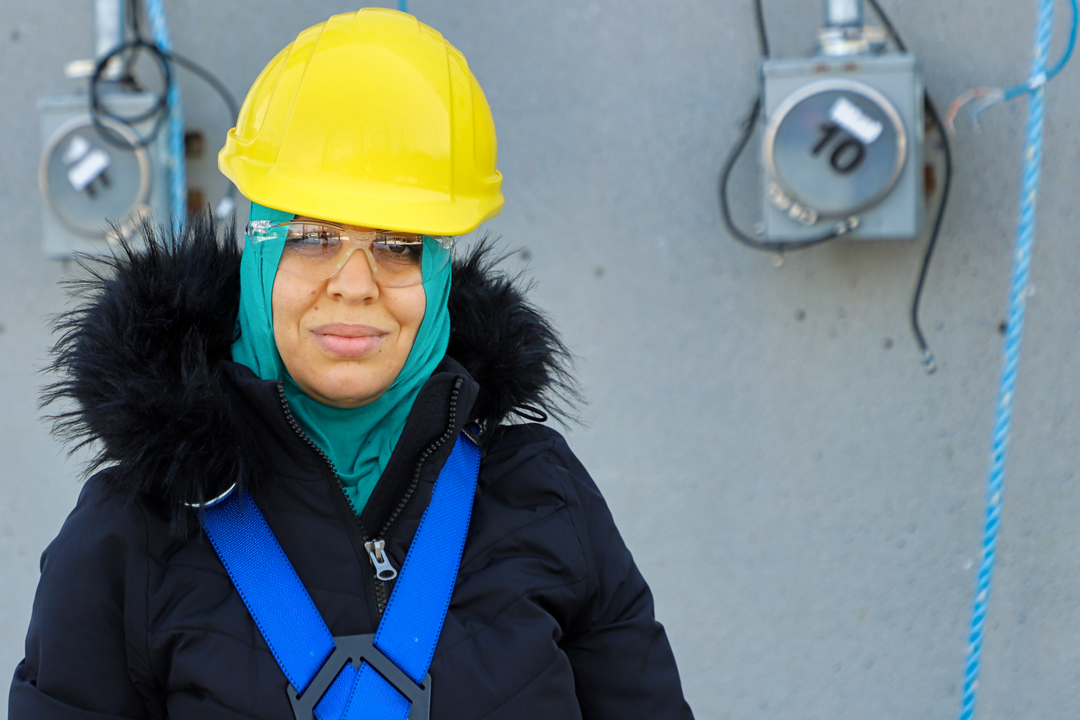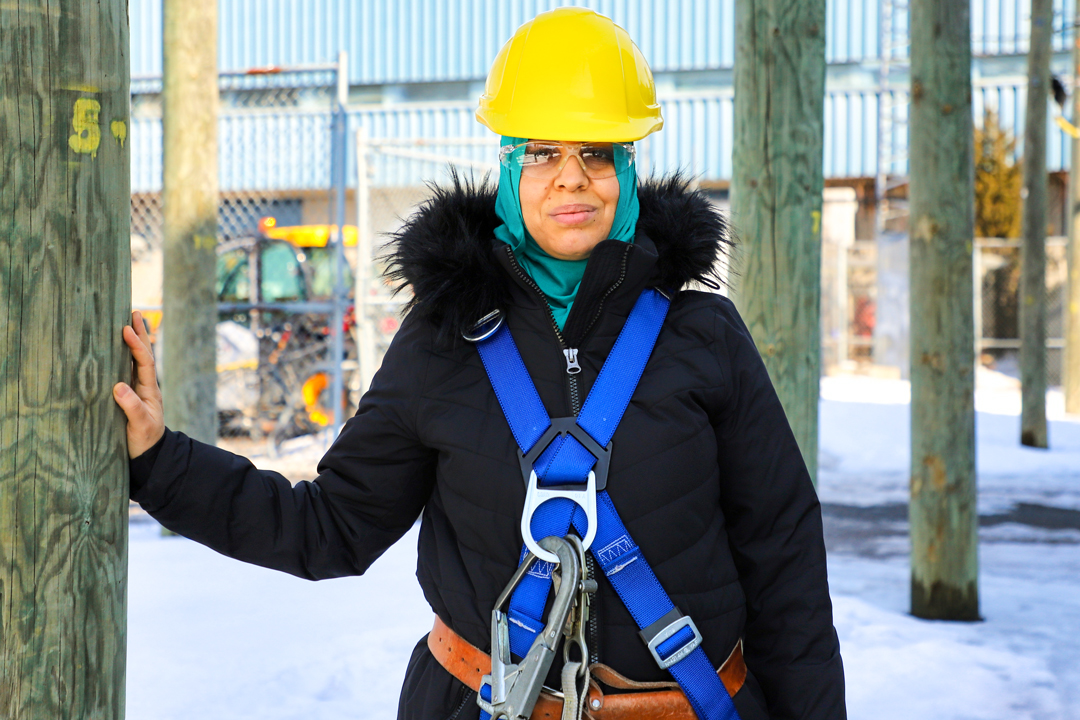Besma Moumni Ep Ben Janallah was born in Beni Metir, a mountainous village in northwest Tunisia. As a child, she had to walk 90 minutes every morning and evening to get to her school in another village. Education has always been important in her family. After obtaining a master's degree in physics, her wedding, a few years teaching overseas and the birth of her two sons, she decided to make her dream of studying in Canada a reality. She is now a student in the Installation and Repair of Telecommunications Equipment DVS, a male-dominated sector, and she is excelling. Besma is an inspiring example to all.
Besma Moumni is 42. She arrived in Canada in June 2021 with her two sons, ages 7 and 8. Her husband, a university professor under contract in Saudi Arabia, joined her in June of the same year. In her family, education is a priority. "We are five siblings in my house, and four of us have a university degree,” she says with pride. "To have a job, studying is essential. We would walk in the rain every morning to get to school. In high school, we were boarders during the week because the school was 35 kilometers from my home." In addition to Arabic, her mother tongue, Besma speaks French and can get by in English.
Before coming to Canada, Besma spent eight years in Saudi Arabia working in academia as a research assistant and substitute teacher. It was a great experience, despite the unbearable heat and the cohesion challenges of working in a school system that was very different from the Tunisian system, and where people of all nationalities were together," she says. During her time there, she was saving up to come study in Canada.
Moving Country During a Pandemic
 After obtaining a master's degree in physics, her wedding, a few years teaching overseas and the birth of her two sons, she decided to make her dream of studying in Canada a reality.
After obtaining a master's degree in physics, her wedding, a few years teaching overseas and the birth of her two sons, she decided to make her dream of studying in Canada a reality.Travelling by plane, moving, and starting a new training program are big sources of stress on their own. When COVID-19 is added to the mix, it becomes very difficult, especially if you have a child with a medical condition. "My eldest is diabetic. The 36 hours it took to travel to Québec was a lot. On top of that, we had to take different precautions for various things like covering health expenses before being eligible for RAMQ, the protocol in case he got ill at his new school, organizing our quarantine, etc.," says Besma.
In January 2021, Besma and her sons went from 35°C in Riyadh to a frigid -20°C in Montreal. She rented an apartment in Laval on the advice of her cousin who lives there, but is thinking about moving to Gatineau after graduation, a city she and her husband fell in love with.
Choosing Vocational Training
 A student in the Installation and Repair of Telecommunications Equipment DVS, she is integrating into the traditionally male-dominated sector.
A student in the Installation and Repair of Telecommunications Equipment DVS, she is integrating into the traditionally male-dominated sector.Besma returned to school for the Installation and Repair of Telecommunications Equipment program. "I want to improve my skills in telecommunications. I really like my program, especially the radio modules and practical workshops. The technology is state of the art." The program lasts 1,800 hours, and she expects to graduate in June 2022 from the Centre de formation professionnelle Léonard-De Vinci in the Montreal borough of Saint-Laurent.
A Winning Choice
 "It's a profession with excellent job prospects that requires independence, resourcefulness and attention to detail. You also have to be versatile to adapt quickly to changes," says Besma Moumni, a student in Installation and Repair of Telecommunicat
"It's a profession with excellent job prospects that requires independence, resourcefulness and attention to detail. You also have to be versatile to adapt quickly to changes," says Besma Moumni, a student in Installation and Repair of TelecommunicatTelecommunications installation worker is a male-dominated trade in Québec. In a group with only one other girl, Besma is learning to install and configure intercoms, cable carriage systems, telecommunications and radio systems, and connect telephone networks and different antennas. With her work boots on, tool belt at her waist, skirt over her required uniform and hard hat over her hijab, she examines different electronic circuits to ensure they are functioning and repairs various telecommunication systems.
Consult other videos related to the trade and training under the Useful links and videos tab on the Installation and Repair of Telecommunications Equipment program page.
Tolerance in Québec?
 A motivated and successful student, she is admired by her teachers, who will recommend her after she graduates.
A motivated and successful student, she is admired by her teachers, who will recommend her after she graduates.Besma has not yet encountered discrimination against Maghrebian immigrant Muslim women in the job search process. In the West, the hijab is stigmatized, and prejudice and stereotypes persist. What is her strategy for getting ahead? Excellence. She is the top-performing student in her cohort. She helps others. "My classmates are very respectful, and my teachers will recommend me after graduation." She is optimistic about the future, and with good reason.
An Evolving Field
 From 35°C in Riyadh to -20°C in Montreal, Besma, surrounded by her family, has succeeded. After graduation, she hopes to settle in Gatineau, a city she and her husband have fallen in love with.
From 35°C in Riyadh to -20°C in Montreal, Besma, surrounded by her family, has succeeded. After graduation, she hopes to settle in Gatineau, a city she and her husband have fallen in love with.In telecommunications, technology is constantly advancing. "It's a profession with excellent job prospects that requires independence, resourcefulness and attention to detail. You also have to be versatile to adapt quickly to changes," she says. "To be up to date, you must be willing to take refresher courses."
Employment Opportunities
After strong growth in the early 2000s, the telecom sector has seen a decline in the last decade, but retirement is changing this. Good prospects can be expected for the next few years. The proof: it has often been listed among the most sought-after jobs for the past decade.
"It's a profession with excellent job prospects that requires independence, resourcefulness and attention to detail. You also have to be versatile to adapt quickly to changes."
Support from Québec Métiers d’Avenir
Québec Métiers d'avenir offers over 80 vocational programs in 95 training centres throughout Québec. These short programs lead to very good job prospects and are accessible to anyone over 17, and there is no age limit. "QMA was a great help. I have recommended their services to four of my acquaintances," explains Besma.

A Male-Dominated Sector
According to the Portrait de la main-d'œuvre dans le secteur des technologies de l'information et de la communication (TIC) au Québec produced by TECHNOCompétences (Comité sectoriel de main-d’œuvre (CSMO) en technologies de l’information et de la communication (TIC)), 78% of the workforce in information technology is male. The number of graduates from vocational training has more than tripled in the past ten years, going from 650 in 2008 to 1,932 in 2019. The proportion of female graduates in 2019 was 33.42%. This is a different reality from what Besma had known. “I have always been passionate about science, computers and robotics. Where I am from, women are present in these fields of study. 60% of science graduates are women in Tunisia."
"In Canada, it is possible to go to school at 40! There are people from different countries and who practice different religions at my centre. You can live in peace and safely here. It takes a lot of courage to immigrate, but nothing is impossible."
